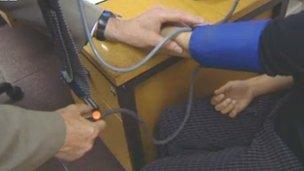'Crisis' GP shortage in rural north Wales, doctor claims
- Published
There are currently only two GPs in Blaenau Ffestiniog.
The family doctor service across parts of rural north Wales needs an urgent increase in GPs within 12 months, a senior medic has warned.
Dr Phil White, secretary of the North Wales Local Medical Committee, said current workloads for GPs were "unsustainable".
Betsi Cadwaladr health board is facing calls to consider setting up a medical school in north Wales to train doctors.
It said it was trying to alleviate immediate GP recruitment problems.
Dr White spoke out after a member of Betsi Cadwaladr Community Health Council called for GP services to be boosted by a medical school in north Wales.
Gwynedd councillor Eryl Jones-Williams said a medical school in the area would mean people who trained there to be doctors would be more likely to say.

The health board said it recognised there were problems with GP recruitment in north Wales
He said: "I would like some kind of training or a university for doctors in north Wales.
"[Trainee doctors] leave to go Cardiff, they go to Manchester and they go to Liverpool. They are there for a long time, between five and seven years to be a doctor, and they tend to stay in those areas.
"It's very difficult to get them back here."
Mr Jones-Williams was responding after councillors in Blaenau Ffestiniog said the number of doctors working in the Gwynedd town had gone down from four to two.
Dr White said north Wales faced a wider problem of a shortage of doctors, particularly in rural areas.
He said the health board was "doing its best to provide some sort of cover" but he feared the service would be "unsustainable" within 12 months without more doctors.
He said: "It's totally unsustainable because many of the doctors who have been left carrying the can are now in the mid, perhaps late 50s, who had perhaps intended to work to 60 or 65.
"But with this intolerable level of pressure, many will take early retirement and turn their backs on the profession.
"We're looking now at areas where there are no regular GPs. We're looking at areas where the numbers of GPs have halved.
"And of course GP numbers across Wales haven't really increased significantly at all in the last 10 years.
"So while the patient numbers have gone up, the actual number of whole-time equivalent general practitioners haven't followed the trend."
He suggested paying newly-qualified doctors a premium to work in remote rural areas, as happens in Australia and New Zealand, even though this would cost extra money.
He said: "A financial incentive in any rural area would be reasonable.
"They're going to have to conjure it from somewhere because without decent primary care and general practice, the secondary system will just collapse.
"People just do not realise how much work primary care has absorbed over the last 10 years.
"It was full saturation almost two years ago when we could say we were almost fully staffed.
"With these huge gaps now in medical cover, it is unsustainable.
"You are looking at within next 12 months because the crisis is here."
'Strong recruitment base'
A Betsi Cadwaladr University Health Board spokesperson said: "The difficulties in recruiting GPs is a national issue, however there are particular problems in specific areas of north Wales.
"We fully recognise these issues and, led by an assistant medical director, work is ongoing to identify and agree measures to alleviate the immediate problems and to develop a strong recruitment base for future years."
The board said it was working to provide good training opportunities for doctors in north Wales and to encourage them to then apply for jobs.
"Proactively, even before students have decided on a career in medicine, we offer local schools opportunities for pupils to come to our hospitals to gain first-hand experience of health service careers," added the spokesperson.
- Published22 August 2012
- Published21 August 2012
- Published22 August 2012